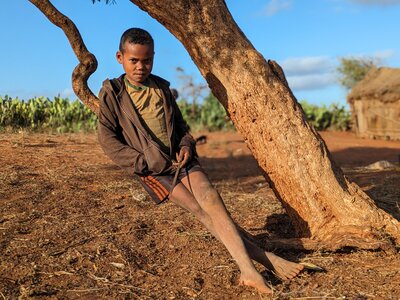Madagascar
- 1.31 million
- people facing high levels of acute food insecurity
- 90%-plus
- of population live on less than US$3.10 a day
- 28 million
- population
Madagascar is the world’s fifth largest island, situated in the Indian Ocean with a population of 28 million people. Despite considerable natural resources, the country faces high poverty rates, with over 90 percent of its population living on less than US$3.10 a day. Chronic malnutrition affects nearly 40 percent of children.
Food insecurity results from factors including lack ranging from crop diversification and high reliance on rain-fed agriculture, to low incomes and rising food prices. Climate shocks are increasing in severity and frequency, causing damage to agriculture, infrastructure, biodiversity and coastal resources, and leading to the loss of lives and livelihoods.
The south of Madagascar is affected by a recurrent drought and the southeast is prone to recurrent cyclones and flooding. In these regions, up to 1.31 million people face high levels of acute food insecurity.
The World Food Programme (WFP) provides emergency food assistance to vulnerable people affected by crises, with operations concentrated in the south and southeast, and helps to build community resilience through innovative solutions. Strong emphasis is also placed on capacity building of Government and partners, such as in emergency preparedness.
What the World Food Programme is doing in Madagascar
-
Disasters preparedness
-
In anticipation of climate shocks, WFP supports communities at risk through measures such as the distribution of disaster-resistant seeds, short-cycle farming activities, cash transfers and the dissemination of early warnings and climate information. WFP also offers logistics support for disaster preparedness and emergency-response coordination. This includes workshops and technical training to strengthen national capacities, and providing equipment to national authorities. In other measures, WFP pre-positions in strategic areas to enable a fast response.
-
Emergency assistance
-
WFP provides emergency food and cash to disaster-affected people, combined with nutritional supplements for women and children. Nutrition support is also provided to people suffering from tuberculosis and HIV/AIDS. Emergency interventions are coupled with food assistance for assets, where food is provided in tandem with people carrying out community work to support early-recovery efforts.
-
Nutrition
-
Through the “MIARO” (“Protect”) approach, WFP provides nutrition support to 42,000 children aged 6–23 months, and pregnant and breastfeeding women, to prevent malnutrition. We provide supplementary feeding and activities such as nutrition education and market gardening. WFP strengthens the capacity of the National Nutrition Office, with a focus on scaling up initiatives that improve availability, access and consumption of nutritious foods.
-
School meals
-
WFP remains the largest provider of school meals in Madagascar, supporting 360,000 children in almost 1,000 primary schools in the southern and southeastern regions. WFP’s school meals programme provides daily hot school meals, helping to increase enrolment and reduce the drop-out rate. WFP is scaling up the home-grown school feeding approach, which aims to supply school canteens with locally produced food. The approach boosts farmers’ incomes while also diversifying school meals.
-
Resilience building
-
WFP builds community resilience to recurrent shocks through innovations such as the Rapid Rural Transformation model. Under this approach, WFP provides communities with solar-powered hubs that generate clean energy for water for domestic and agricultural use. Training is also provided. The availability of clean energy has allowed people to set up businesses such as retail shops, while others are using the solar-powered energy to repair agricultural equipment. At the same time, WFP supports 92,000 people with asset creation and skills training, and 102,000 smallholder farmers with training in post-harvest losses and support for agricultural production, food diversification and climate change adaptation.
-
Logistics
-
The UN Humanitarian Air Service (UNHAS) facilitates post-disaster assessments and access to hard-to-reach areas. It ensures the prompt delivery of humanitarian aid cargo and personnel.
Madagascar news releases
Go to pagePartners and Donors
Find out more about the state of food security in Madagascar
Visit the food security analysis pageOperations in Madagascar
Contacts
Office
2nd floor, Business Center d’ Alarobia - Enceinte Novotel Ankorondrano BP 4199
101 Antananarivo
Madagascar







